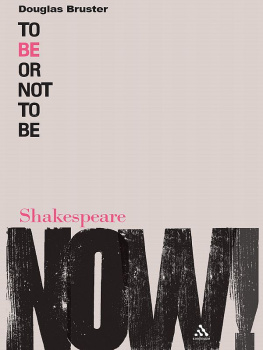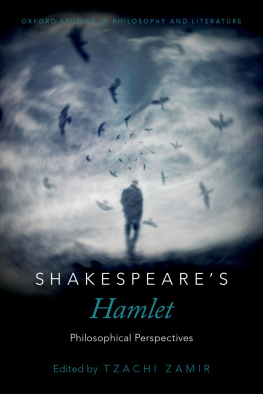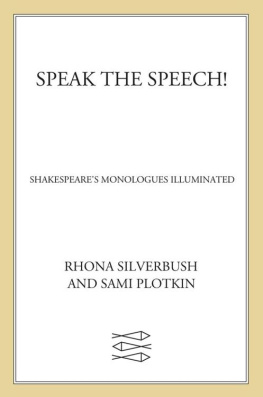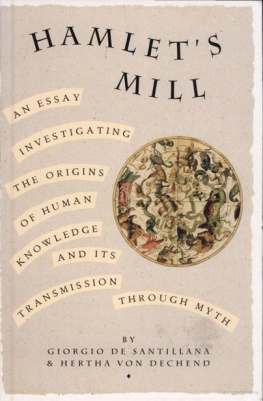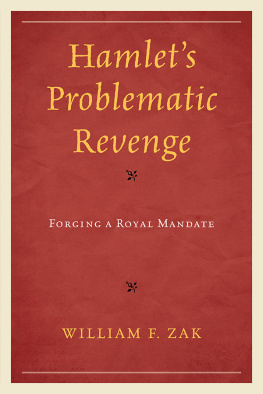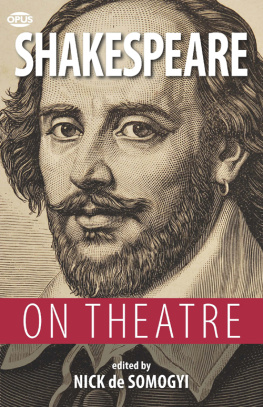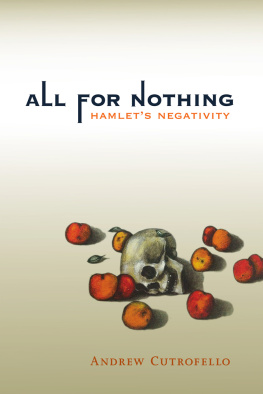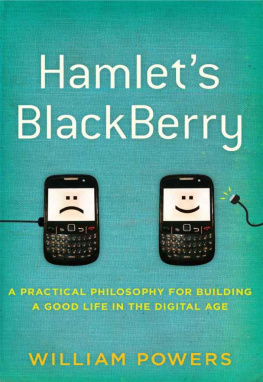To Be Or Not To Be
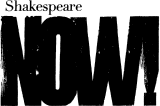
Series edited by:Simon Paifrey and Ewan Fernie
Shakespeare Thinking Philip Davis
Shakespeare Inside Amy Scott-Douglass
Shakespeares Modern Collaborators Lukas Erne
Shakespeare and the Political Way Elizabeth Frazer
Godless Shakespeare Eric S. Maliin
Shakespeares Double Helix Henry S, Turner
Shakespearean Metaphysics Michael Witmore
To Be Or Not To Be
Douglas Bruster

Continuum
The Tower Building | 80 Maiden Lane |
11 York Road | Suite 704 |
London | New York |
SE1 7NX | NY 10038 |
www.continuumbooks.com
Douglas Bruster 2007
Douglas Bruster has asserted his right under the Copyright, Designs and Patents Act, 1988, to be identified as Author of this work.
All rights reserved. No part of this publication may be reproduced or transmitted in any form or by any means, electronic or mechanical, including photocopying, recording, or any information storage or retrieval system, without prior permission in writing from the publishers.
British Library Cataloguing-in-Publication Data
A catalogue record for this book is available from the British Library.
ISBN-10: HB: 0-8264-8997-4
PB: 0-8264-8998-2
ISBN-13: HB: 9780826489975
PB: 9780826489982
Library of Congress Cataloging-in-Publication Data
A catalog record for this book is available from the Library of Congress.
General Editors Preface
Shakespeare Now! represents a new form for new approaches. Whereas academic writing is far too often ascendant and detached, attesting all too clearly to years of specialist training, Shakespeare Now! offers a series of intellectual adventure stories: animate with fresh and often exposed thinking, with ideas still heating in the mind.
This series of minigraphs will thus help to bridge two yawning gaps in current public discourse. First, the gap between scholarly thinking and a public audience: the assumption of academics that they cannot speak to anyone but their peers unless they hopelessly dumb-down their work. Second, the gap between public audience and scholarly thinking: the assumption of regular playgoers, readers, or indeed actors that academics write about the plays at a level of abstraction or specialization that they cannot hope to understand.
But accessibility should not be mistaken for comfort or predictability. Impatience with scholarly obfuscation is usually accompanied by a basic impatience with anything but (supposed) common sense. What this effectively means is a distrust of really thinking, and a disdain for anything that might unsettle conventional assumptions, particularly through crossing or re-drafting formal, political, or theoretical boundaries. We encourage such adventure, and base our claim to a broad audience upon it.
Here, then, is where our series is innovative: no compromising of the sorts of things that can be thought; a commitment to publishing powerful cutting-edge scholarship; but a conviction that these things are essentially communicable, that we can find a language that is enterprising, individual, and shareable.
To achieve this we need a form that can capture the genuine challenge and vigour of thinking. Shakespeare is intellectually exciting, and so too are the ideas and debates that thinking about his work can provoke. But published scholarship often fails to communicate much of this. It is difficult to sustain excitement over the 80-120,000 words customary for a monograph: difficult enough for the writer, and perhaps even more so for the reader. Scholarly articles have likewise become a highly formalised mode not only of publication, but also of intellectual production. The brief length of articles means that a concept can be outlined, but its implications or application can rarely be tested in detail. The decline of sustained, exploratory attention to the singularity of a plays language, occasion, or movement is one of the unfortunate results. Often the play is somehow assumed, a known and given thing that is not really worth exploring. So we spend our time pursuing collateral contexts: criticism becomes a belated, historicizing footnote.
Important things have got lost. Above all, any vivid sense as to why we are bothered with these things in the first place. Why read? Why go to plays? Why are they important? How does any pleasure they give relate to any of the things we labour to say about them? In many ways, literary criticism has forgotten affective and political immediacy. It has assumed a shared experience of the plays and then averted the gaze from any such experience, or any testing of it. We want a more ductile and sensitive mode of production; one that has more chance of capturing what people are really thinking and reading about, rather than what the pre-empting imperatives of journal or respectable monograph tend to encourage.
Furthermore, there is a vast world of intellectual possibility- from the past and the present that mainstream Shakespeare criticism has all but ignored. In recent years there has been a move away from theory in literary studies: an aversion to its obscure jargon and complacent self-regard; a sense that its tricks were too easily rehearsed and that the whole game has become one of diminishing returns. This has further encouraged a retreat into the supposed safety of historicism. Of course the best such work is stimulating, revelatory, and indispensable. But too often there is little trace of any struggle; little sense that the writer is coming at the subject afresh, searching for the most appropriate language or method. Alternatively, the prose is so labored that all trace of an urgent story is quite lost.
We want to open up the sorts of thinking and thinkers that might help us get at what Shakespeare is doing or why Shakespeare matters. This might include psychology, cognitive science, theology, linguistics, phenomenology, metaphysics, ecology, history, political theory; it can mean other art forms such as music, sculpture, painting, dance; it can mean the critical writing itself becomes a creative act.
In sum, we want the minigraphs to recover what the Renaissance essay form was originally meant to embody. It meant an assay a trial or a test of something; putting something to the proof; and doing so in a form that is not closed-off and that cannot be reduced to a system. We want to communicate intellectual activity at its most alive: when it is still exciting to the one doing it; when it is questing and open, just as Shakespeare is. Literary criticism that is, really thinking about words in action, plays as action can start making a much more creative and vigorous contribution to contemporary intellectual life.
Simon Palfrey and Ewan Fernie
To be or not to be
To be, or not to be, that is the question:
Whether tis nobler in the mind to suffer
The slings and arrows of outrageous fortune,
Or to take arms against a sea of troubles,
And by opposing, end them. To die, to sleep
No more, and by a sleep to say we end
The heart-ache and the thousand natural shocks
That flesh is heir to; tis a consummation
Devoutly to be wishd. To die, to sleep
To sleep, perchance to dream ay, theres the rub,
For in that sleep of death what dreams may come,
When we have shuffled off this mortal coil,
Next page
